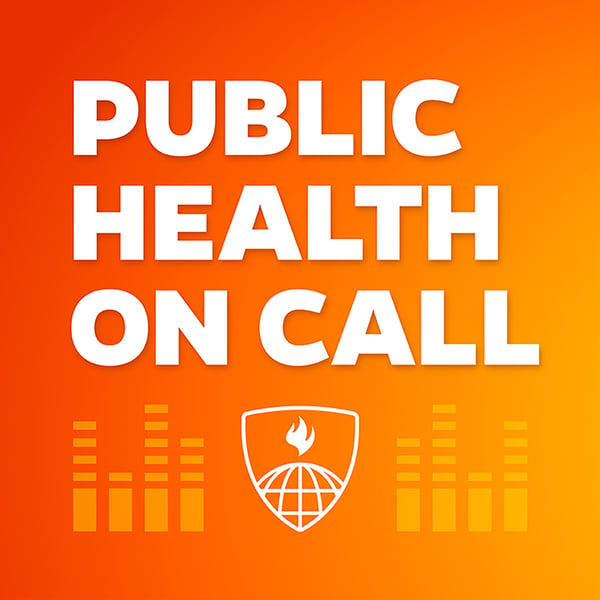907 - Humanitarian Health in Gaza and Beyond
Public Health On Call
The Johns Hopkins Bloomberg School of Public Health
4.8 • 620 Ratings
🗓️ 16 June 2025
⏱️ 19 minutes
🧾️ Download transcript
Summary
About this episode:
Humanitarian health systems provide relief like food, water, and medicine in crisis situations. They operate within a carefully organized framework built on core principles including impartiality and neutrality. In this episode: what's happening with humanitarian aid in Gaza and the importance of a new framework for global humanitarian efforts.
Guest:
Dr. Paul Spiegel is a physician, epidemiologist and the director of the Center for Humanitarian Health at the Johns Hopkins Bloomberg School of Public Health. Dr Spiegel has worked in humanitarian emergencies for the last 30 years.
Host:
Dr. Josh Sharfstein is vice dean for public health practice and community engagement at the Johns Hopkins Bloomberg School of Public Health, a faculty member in health policy, a pediatrician, and former secretary of Maryland’s Health Department.
Show links and related content:
-
Group Accuses Hamas of Threatening Aid Workers in Gaza—The New York Times
-
A Flawed Attempt at Delivering Gaza Aid Led to a Wave of Deaths—The Wall Street Journal (paywall)
-
The Humanitarian Response in Gaza—Public Health On Call (January 2024)
Transcript information:
Looking for episode transcripts? Open our podcast on the Apple Podcasts app (desktop or mobile) or the Spotify mobile app to access an auto-generated transcript of any episode. Closed captioning is also available for every episode on our YouTube channel.
Contact us:
Have a question about something you heard? Looking for a transcript? Want to suggest a topic or guest? Contact us via email or visit our website.
Follow us:
-
Here's our RSS feed
Note: These podcasts are a conversation between the participants, and do not represent the position of Johns Hopkins University.
Transcript
Click on a timestamp to play from that location
| 0:00.0 | Welcome to Public Health On Call, a podcast from the Johns Hopkins Bloomberg School of Public Health, |
| 0:05.9 | where we bring evidence, experience, and perspective to make sense of today's leading health challenges. |
| 0:16.3 | If you have questions or ideas for us, please send an email to Public Health Question at jh.edu. |
| 0:23.8 | That's public health question at jh.edu for future podcast episodes. |
| 0:32.6 | The world has never seen war like this before. |
| 0:38.3 | I can use your face to call for genocide. |
| 0:42.3 | New weapons. |
| 0:43.3 | I think the new age of conflict is definitely going to be across ones and zeros, |
| 0:49.3 | and it's not necessarily going to just impact warriors on the battleground. |
| 0:53.3 | New conflicts. |
| 0:56.3 | Nowadays, we receive nearly 3,000 patients on a daily basis and new challenges. |
| 1:02.7 | A freeze on foreign aid continues to cause confusion and spread fear among humanitarian workers. |
| 1:07.9 | Go to the front lines, behind closed doors, and explore the conflicts tearing the world apart |
| 1:14.0 | and the projects keeping us together. |
| 1:16.5 | Because you never know when war may reach your own borders. |
| 1:20.4 | Only on Intercross, a podcast from the International Committee of the Red Cross. |
| 1:25.9 | It's Lindsay Smith Rogers. |
| 1:28.0 | Today, humanitarian aid in Gaza and beyond. |
| 1:32.6 | Dr. Paul Spiegel is the director of the Center for Humanitarian Health at the Johns |
| 1:37.1 | Hopkins Bloomberg School of Public Health. |
| 1:39.5 | He speaks to Dr. Josh Sharfstein about the historic principles of humanitarian work, the controversy |
| 1:45.9 | surrounding the Gaza Health Foundation, and the transformation needed to provide aid more |
... |
Please login to see the full transcript.
Disclaimer: The podcast and artwork embedded on this page are from The Johns Hopkins Bloomberg School of Public Health, and are the property of its owner and not affiliated with or endorsed by Tapesearch.
Generated transcripts are the property of The Johns Hopkins Bloomberg School of Public Health and are distributed freely under the Fair Use doctrine. Transcripts generated by Tapesearch are not guaranteed to be accurate.
Copyright © Tapesearch 2025.

